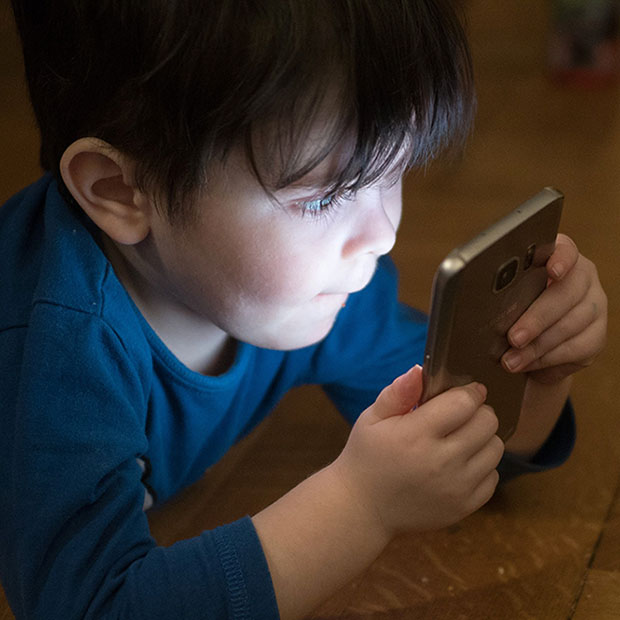Is Blue Light Bad for Our Eyes?

How big of a role does a bright screen play in your nightly routine?
Since the advent of handheld devices that could access the internet, a lot of us have been browsing websites late into the night, our eyes glued to a bright little screen, making sure we haven’t missed any updates before we go to sleep. As optometrists, we can’t endorse this bedtime ritual. Screens emit a lot of blue light, which affects both our internal clocks and our eye health.
The Physics of Visible Light
The range of colors we can see is known as the visible light spectrum, a tiny sliver of the electromagnetic spectrum. Red light is the lowest energy light we can see and violet light is the highest. Below red light is infrared and above violet light is ultraviolet radiation. (Fun fact: the reason the sky and ocean appear blue to us is that blue light scatters more easily than other colors.)
The Impact of Artificial Light
For most of human history, the only source of blue light on Earth was the sun. Our bodies react to it. We feel more attentive, react faster, remember things better, and feel better overall during the day. When the sun goes down, it signals our bodies that it’s time to sleep. Biologically, we aren’t used to the concept of artificial light, which can be a problem when there’s so much of it around us.
When we use our phones or computers right before bed, we’re beaming subconscious signals to our brains that it’s not time to sleep yet, no matter how late it is. Our brains respond by suppressing the release of melatonin, an important neurotransmitter that helps us sleep. The result is that it takes us longer to fall asleep than it would otherwise and lowers our overall quality of sleep, which feeds into all the negative health effects of sleep deprivation.
A great way to avoid all these sleep issues is to simply put our devices away in the hour before we go to sleep. In cases where that isn’t possible, use the night mode function to cut out the blue light.
Blue Light and Eye Health
Because blue light is so close to UV radiation on the electromagnetic spectrum, many optometrists are concerned that it could be similarly harmful to our eyes, potentially increasing the risk of conditions like age-related macular degeneration. Fortunately, the screens we use emit only a tiny fraction of the blue light the sun emits (and none of the UV light).
A more immediate concern from blue light exposure is digital eye strain. After hours and hours of looking at a bright screen, our eyes might ache or struggle to focus, and we can even get headaches. Computer glasses and screen filters help make screens easier to look at, but a great trick is the 20-20-20 rule. Every 20 minutes, take a 20 second break to focus on an object 20 feet away.
We Can Answer Your Questions About Blue Light
If you’ve been experiencing symptoms of eye strain and want recommendations or you have other questions about how blue light can impact eye health, we’d love to discuss it with you at our practice! We want all of our patients to have the information they need to keep their eyes healthy.
